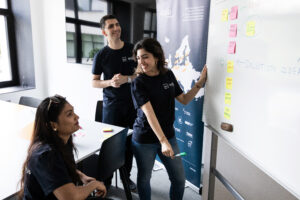The ECIU Alliance, which includes Kaunas University of Technology (KTU), has developed and completed testing a new type of university model. Perhaps we are closer to Harvard than we thought?
The only reason Harvard is mentioned here is because of the metaphor of the classical university. It is a university of excellence, with successful systems of study, research, and innovation. Many European universities have similar models, but national coverage and funding models make it difficult for them to compete on a global scale.
Reshaping established forms
As mentioned above, the EU is experimenting with funding pilot pan-European university alliances that typically involve universities in EU countries cooperate to create a model where students from different countries study together. At the same time, researchers and partners from the business and public sectors grow European-style research and innovation ecosystems jointly.
The key historical formats that it seeks to break and redesign are the study system and the models of research and innovation activities. Study systems are still based on credit-intensive programmes that are rigid. Science and innovation models are often fragmented, disjointed, and not relevant to real challenges, driven by the needs of scientists rather than society
New study models include micro-modules, personalised learning pathways, digital crediting, competency portfolios, and others.
Over the last few years, KTU together with ECIU partners have developed and tested an innovative prototype of a research institute of the future as part of the EU’s “Horizon 2020” funded project SMART-ER (“ECIU University Research Institute for Smart European Regions”).
Meanwhile, emerging business-science-public partnerships, projects, and publications are already showing that the new ECIU model is capable of challenging traditional heavyweights like Harvard.
What will the University look like in the future?
The ECIU University, of which KTU is a member, has already submitted recommendations to the European Commission on how to develop micro-modules and systems for crediting and accumulating competencies that would allow personalised learning.
Imagine learning mathematics in Barcelona and mechanics in Lithuania, this also means that you can learn everything in Lithuania. However, instead of registering for a programme that you have to complete in its entirety, you would register for the qualification you want to get and collect learning and practice credits from the various partners involved in the learning ecosystem to achieve it.
In the field of science, ECIU University has developed and tested a virtual research institute model in recent years. It complements study activities with research and innovation activities. Virtual institutes are no longer a surprise. However, ECIU University’s virtual research institute SMART-ER has a unique approach in its challenge-based research and innovation programme.
In the traditional model, research programmes are shaped by the scientists’ research profiles, and priorities are selected based on national or international strategic documents. Challenge-based research programmes are drawn up by external stakeholders, according to their interests, to address the most pressing societal, business, and public-sector challenges of the time.
A developed citizen science platform
Insights and fundamental research are still being drawn on, but they are being harnessed to a more general mission of tackling challenges. For example, science and innovation to accelerate the digital transition or urban adaptation to climate change. Citizen engagement is a crucial dimension here.
It is common for universities to work with business and public sector partners. The ECIU has developed a citizen science platform and made recommendations to the European Commission for greater transparency in science and public participation in research and innovation processes. Whilst these ideas have been around in Europe for several years, ECIU University’s innovation is targeted funding of citizen science to bring about real change and democratisation of science.
The ECIU University Virtual Research Institute has passed the testing phase. At present, the research programme, inter-institutional agreements, governance structure and operational guidelines for such a pan-European institute have been developed. More information is available here: https://www.eciu.eu/research. The plans for the future include ambitious projects and new achievements. Harvard, don’t feel alone – Europe is coming.
The SMART-ER project is funded under the European Union’s “Horizon 2020” research and innovation programme grant agreement No. 101016888. It reflects the views only of the authors, and the EU is not responsible for any use that may be made of the information contained therein.




